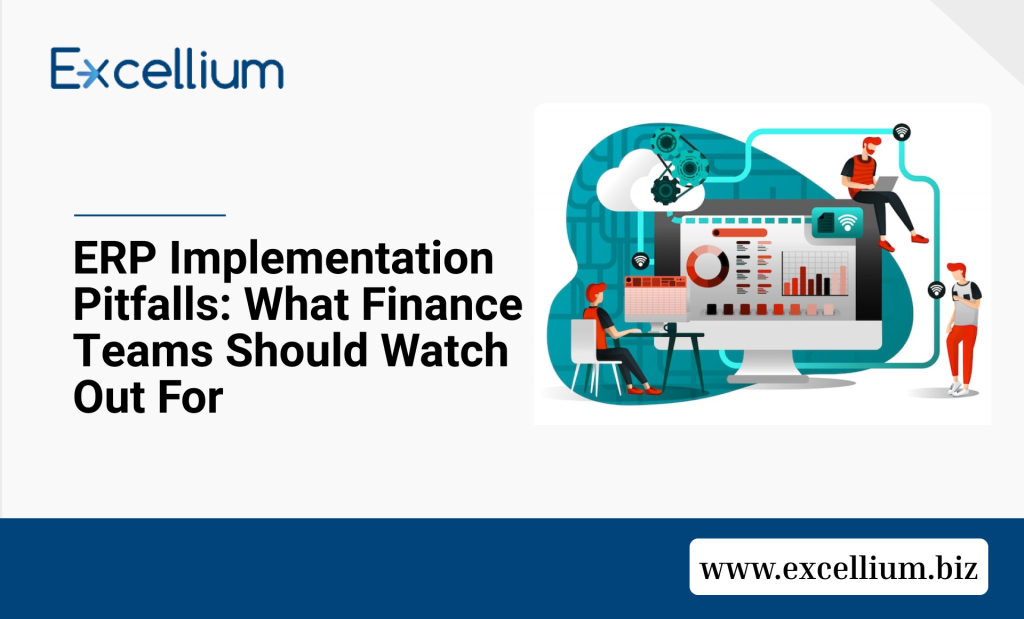
Implementing an ERP system can be a game-changer for finance teams, streamlining operations, improving compliance, and unlocking real-time insights. But let’s be honest: not every ERP project ends in glory.
In fact, more than half of ERP implementations either fail outright or fall short of expectations. And many of those failures? They start with mistakes in the finance department.
This blog post is your early warning system. Whether you’re a CFO, finance manager, or ERP sponsor, here’s what to watch out for and how to avoid the common traps that can derail your ERP journey.
Pitfall 1: Leaving Finance Out of the Early Stages
One of the biggest mistakes companies make is treating ERP as an IT project. Finance gets looped in late, usually when it’s time to test reports or approve journal entries.
Why this is a problem:
- Reporting gaps emerge.
- Compliance risks go unnoticed.
- Manual workarounds creep back in.
Fix it: Finance must be involved from day one, defining requirements, setting success criteria, and shaping audit-ready outputs. You’re not just a stakeholder; you’re a co-architect.
Pitfall 2: Poor Project Planning and Scope Creep
ERP projects are complex. Without clear goals and tight project management, timelines slip, budgets balloon, and features get added midstream.
What this means for finance:
- Delays in month-end close
- Unfinished modules at go-live
- Surprise costs for “must-have” features
Fix it: Set clear objectives and realistic milestones, and get executive backing. Stick to the plan and resist the urge to “just add one more thing.”
Pitfall 3: Underestimating Data Migration
Case: Adept Energy Solutions
They had 10+ years of data across QuickBooks, Excel, and even paper journals. They assumed it would be a simple import.
What went wrong:
- Duplicate vendors
- Incomplete chart of accounts
- Unreconciled historical balances
- 3-week delay during UAT
Fix it: Treat data migration as a full subproject. Clean, map, validate, and test your data early. Don’t wait until go-live to discover what’s missing.
Pitfall 4: Overlooking Real-World Finance Workflows
ERP design sessions often focus on the “ideal” process. But finance lives in the messy middle of last-minute accruals, retroactive tax changes, and missing POs.
If your ERP can’t handle that?
You’ll be back in Excel faster than you can say “month-end close.”
Fix it: Test the system using real historical data. Simulate actual month-end scenarios. Make sure the system works in the real world not just on paper.
Pitfall 5: Over-Customizing the Finance Module
Case: Smart Logistics Co.
They built custom approval flows, dashboards, and GL structures.
What went wrong:
- Reporting errors
- Upgrade delays
- Consultant dependency
Fix it: Stick to standard features unless customization solves a real business or compliance need. Simpler systems are easier to maintain and easier to trust.
Pitfall 6: Inadequate Training and Change Management
Case: Allied Builders Ltd
Their accountants weren’t trained on new AP workflows or intercompany journals.
What happened:
- Delayed payments
- Misposted entries
- Month-end close doubled in time
Fix it: Provide role-based training. Use real scenarios like audit prep or tax filings. Offer refresher sessions post go-live. And communicate the “why,” not just the “how.”
Pitfall 7: Ignoring Integration and Compliance Needs
Your ERP must play nicely with other systems, such as CRM, procurement, and payroll, and meet local compliance standards.
If it doesn’t?
You’ll face data silos, duplicate entries, and potential penalties.
Fix it: Ensure your ERP supports local tax rules (VAT, WHT, PAYE), audit trails, and regulatory reporting. Work with partners who understand your industry and region.
Pitfall 8: Delaying Reporting Requirements
Case: Metro Tech Ltd
They waited until after go-live to define reporting needs.
What went wrong:
- No cash flow forecasts
- Gaps in management reports
- Extra consultant fees
Fix it: Define every report you need statutory, internal, board-level before implementation. Test them thoroughly.
Real Talk from the CFO’s Desk
Many CFOs dream of an ERP that automates routine tasks and frees up their team for strategic work. But without addressing these pitfalls, they end up with
- Restrictive systems
- Duplicated efforts
- Ongoing data integrity issues
- Projects that are over budget and behind schedule
Best Practices for Finance Teams
- Engage early and often: Be part of the ERP team from day one.
- Map real workflows: Include exceptions and edge cases.
- Prioritize data quality: Audit and cleanse before migration.
- Test rigorously: Use sandbox environments with real data.
- Plan for change: Build a training and communication plan.
- Ensure compliance: Bake tax and regulatory needs into the design.
Final Thoughts: Finance Is the Heart of ERP Success
ERP implementation isn’t just about software; it’s about people, process, and precision. And finance sits at the center of it all.
When finance teams lead with clarity, own their role, and avoid these common traps, ERP becomes a powerful tool, not a painful lesson.
So if you’re about to start your ERP journey, remember to watch your step, ask the right questions, and lead with confidence.
Need Help Navigating ERP Implementation?

